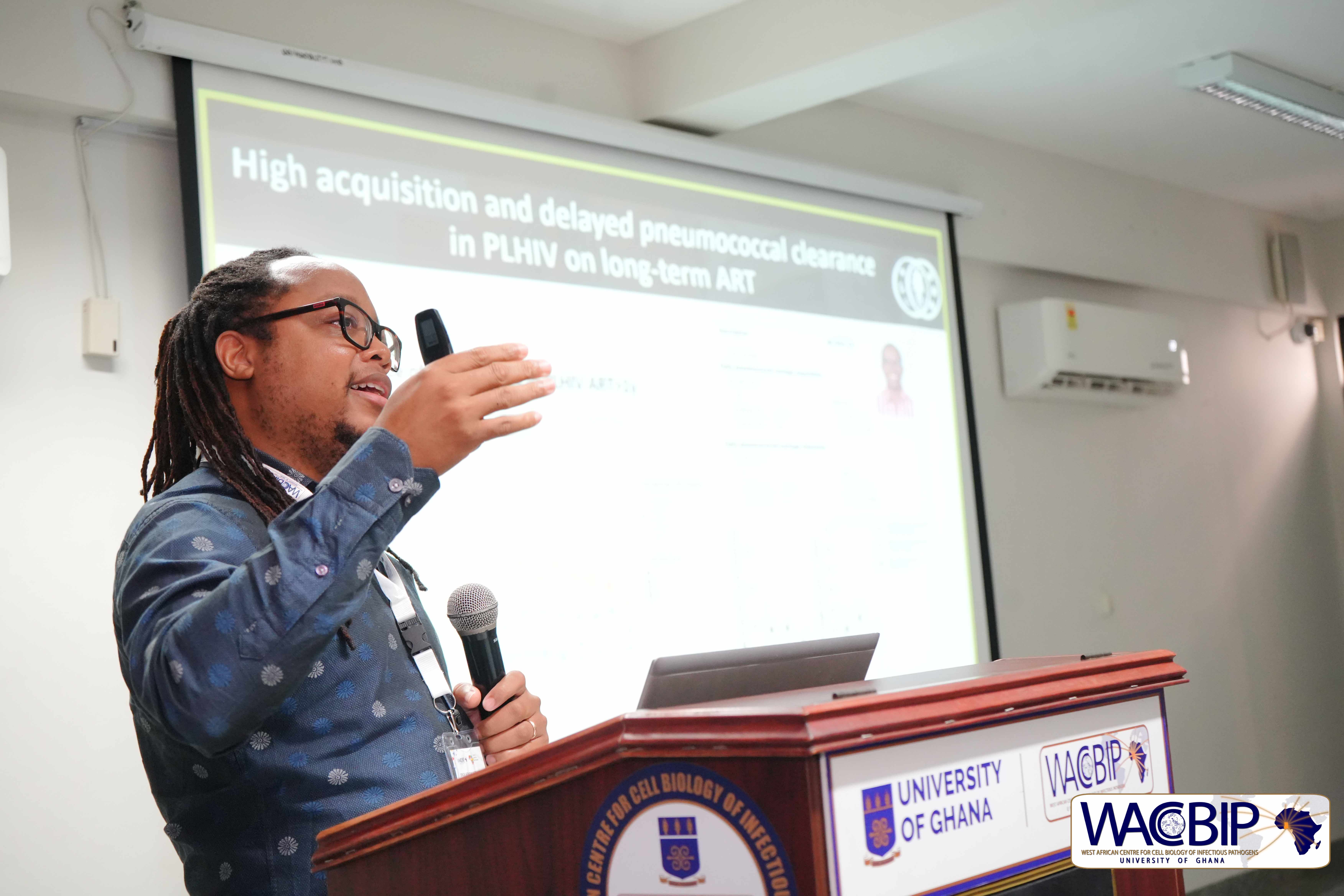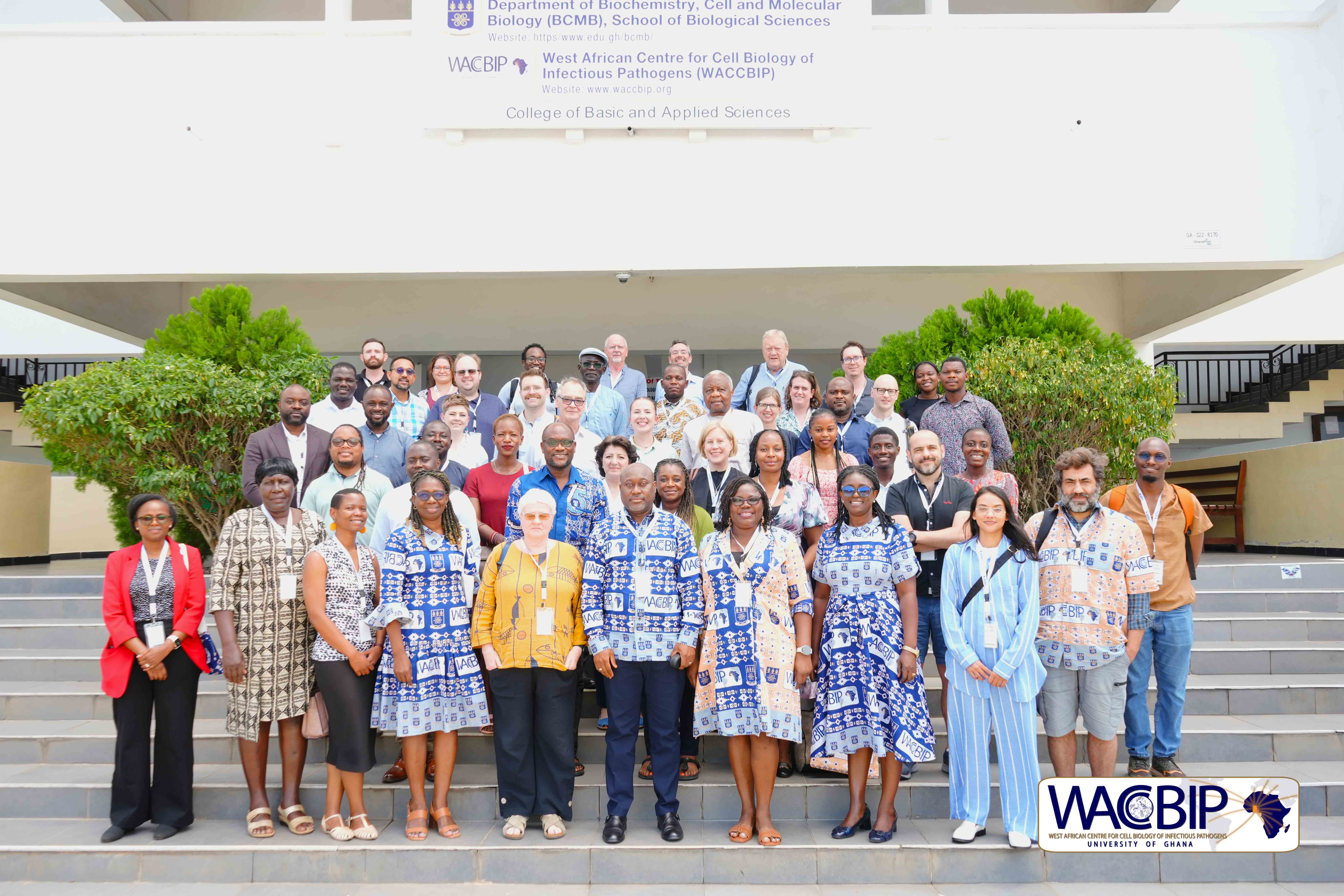Accra, Ghana — From May 14 to 16, 2025, the West African Centre for Cell Biology of Infectious Pathogens (WACCBIP) was host to a transformative gathering of minds, as it welcomed leading scientists, researchers, and fellows from across Africa and the United Kingdom for the second Annual Scientific Meeting of the Crick Africa Network (CAN).
Supported by the Francis Crick Institute and LifeArc, the three-day event reaffirmed Africa’s growing role in shaping the future of global biomedical research.
The meeting opened with inspirational remarks from Prof. Gordon Awandare, founding director of WACCBIP, and Prof. Jean Langhorne, principal group leader at the Francis Crick Institute and director of the CAN initiative. Both leaders emphasized the critical need for sustained investment in African-led science, highlighting how initiatives like CAN are helping to build scientific capacity, strengthen regional networks, and promote the next generation of African research leaders.

Setting the stage for the scientific discourse, Dr. Kondwani Jambo of the Malawi-Liverpool-Wellcome Trust delivered a compelling keynote on the lingering burden of pneumococcal disease in HIV-positive populations—even in the wake of widespread vaccine coverage. His presentation underscored the complex and evolving challenges faced in infectious disease management across the continent and established the conference’s central theme: real-world scientific innovation rooted in African realities.

Throughout the meeting, a broad spectrum of cutting-edge research was shared by current CAN fellows and alumni. Presentations covered key areas such as vaccine response prediction, tuberculosis treatment outcomes, HIV reservoir dynamics, and malaria vector surveillance. One of the standout contributions came from Dr. Abdou Camara, whose work on profiling memory B cells has the potential to revolutionize how scientists assess the durability of vaccine-induced immunity. Equally significant was the research presented by Dr. Sheila Balinda, who explored how the genetic diversity of HIV subtypes in Africa influences immune recovery and the persistence of viral reservoirs—an area of study with major implications for the development of more effective therapies.

Adding further depth to the scientific discussions was Prof. Lydia Mosi, who introduced participants to the world of Mycobacterium ulcerans, the causative agent of Buruli ulcer. She emphasized the importance of the One Health approach and the value of community collaboration in tackling neglected tropical diseases. Her message resonated with attendees, reinforcing the idea that scientific breakthroughs must be closely aligned with local knowledge and community-based interventions.
A notable highlight of the conference was a dynamic panel discussion focused on the challenges of managing high-end research technologies in low- and middle-income countries. Moderated by Prof. Awandare and Dr. Lucy Collinson, the discussion featured experts such as Joyce Ngoi, Dr. Yaw Aniweh, and Abdul Sesa. The panellists spoke with refreshing candour about infrastructural bottlenecks, regulatory burdens, and the need for tax waivers on imported laboratory equipment and reagents. They also called for stronger political engagement to create an enabling environment for science to thrive in Africa.

Technology development took centre stage on the second day of the conference. Fellows working in this area shared practical insights on improving core scientific platforms. Caron Jacobs detailed advancements in microscopy infrastructure, while Tim Reid provided an overview of efforts to establish robust flow cytometry services that can support a broad range of biomedical investigations. Complementing these discussions, Dr. Philippa Matthews of the Crick Institute delivered a nuanced analysis of hepatitis B treatment outcomes, urging a more individualized public health strategy that takes into account the wide variability in patient responses.
Attendees also had the opportunity to tour WACCBIP’s world-class research laboratories, gaining a firsthand look at the infrastructure that supports the Centre’s groundbreaking work. These visits offered valuable context and sparked discussions on how best to replicate similar scientific environments across the continent.

The final day of the meeting began with an impassioned call to action from Prof. Rose Hayeshi of North-West University. Addressing the young scientists in attendance, she urged them to embrace innovation within their constraints and to cultivate ecosystems of support and resilience around their work. Her message was both practical and empowering—reminding attendees that resource limitations need not hinder creativity or ambition.
Building on that momentum, Dr. Yaw Bediako, CEO and co-founder of Yemaachi Biotech, took the stage to share his vision for Africa’s burgeoning biotech industry. Framing biotechnology as a driver of the continent’s next phase of economic development, he outlined the opportunities and challenges involved in commercializing research and translating discoveries into impactful health solutions. His session concluded with a guided tour of Yemaachi Biotech’s facilities, offering a glimpse into the future of homegrown scientific enterprise.
As the meeting drew to a close, Prof. Jean Langhorne returned to the podium to deliver heartfelt closing remarks. She praised the depth and diversity of the research presented, commended the fellows and mentors for their dedication, and expressed hope that the collaborations forged during the event would continue to grow and inspire.
The 2025 Crick Africa Network Annual Scientific Meeting was far more than a showcase of scientific excellence. It was a space for honest dialogue, an incubator for new ideas, and a powerful reminder that the future of global health research is being shaped—in laboratories, classrooms, and communities across Africa—by those committed to scientific integrity, innovation, and collaboration.






